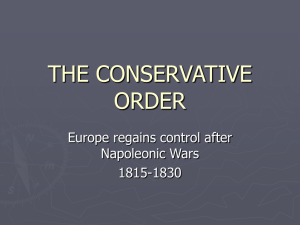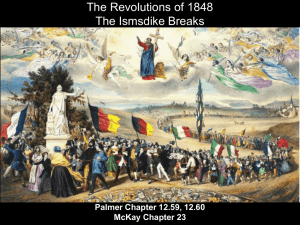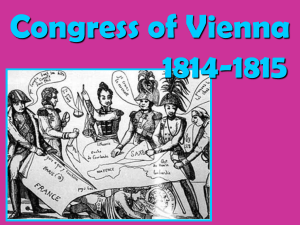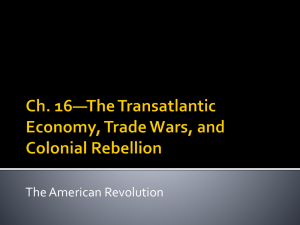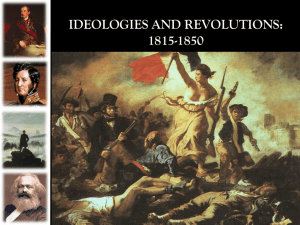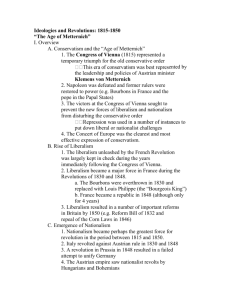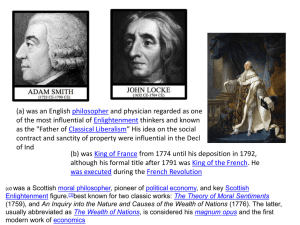The Conservative Order and the Age of Metternich
advertisement
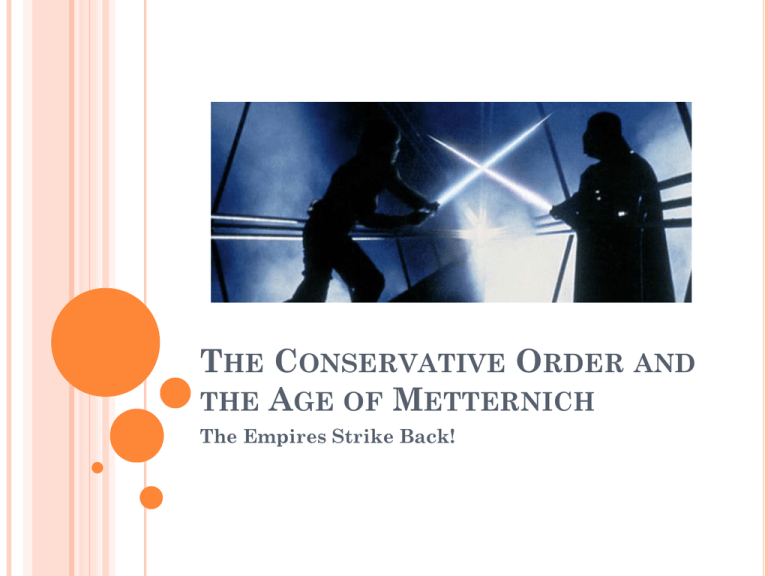
THE CONSERVATIVE ORDER AND THE AGE OF METTERNICH The Empires Strike Back! WHAT ARE THESE TERMS? THE KEY TO YOUR AP EXISTENCE FOR THE NEXT TWO WEEKS OR SO… Conservatism – keeping the status quo…keeping the kings in charge and letting the absolute monarchs run the show Liberalism – open up democracy to the educated and landowning middle class…elect representatives to legislative bodies and avoid mass democracy Nationalism – a great pride in your culture or country…will be driving force behind separate ethnicities and cultures being administered by their own representative government THE CONGRESS OF VIENNA Let’s fix this! CONGRESS OF VIENNA Representatives of major powers of Europe, including France, met to redraw territorial lines and to try and restore the social and political order of the Old Regime Big Five Klemens Von Metternich – AUSTRIA Lord Castlereagh – GREAT BRITAIN Czar Alexander I – RUSSIA Some Prussian – PRUSSIA Minister Talleyrand – FRANCE THE CONGRESS OF VIENNA SEPTEMBER 1814-JUNE 1815 WHAT THE WHITE MEN WANT Legitimacy The deposed kings are returned to their power Bourbons restored in France, Spain, and Naples Compensation Reward states which helped defeat Napoleon with land England receives naval bases Austria receives Italian provinces Russia receives much of Poland, and Alexander becomes king WHAT THE WHITE MEN DID Balance of Power GOAL: Arrange the map so that one country can never gain enough power to be able to take over Strategies to encircle France Strengthen the Netherlands – buffer state of “Belgium” German Confederation (Bund) Official end of Holy Roman Empire Austria is President of the Assembly of Confederation Loose confederation of states where members remained pretty much sovereign LEGACY OF THE CONGRESS OF VIENNA Goal – Make a Europe where there will never be another war Britain emerges as the most powerful country and the lone growing power Successfully restored the European balance of power…relative peace for the next 100 years Criticism for limiting and discouraging the spread of Enlightenment ideas Underestimated the new nationalism generated by the French Revolution THE CONCERT OF EUROPE 1815-1850s CONCERT OF EUROPE A series of arrangements to enforce the status quo as defined by the Vienna settlement Highly conservative and against liberalism/nationalism Two Components Quadruple Alliance Congress System CONCERT OF EUROPE QUADRUPLE ALLIANCE Quadruple Alliance – Russia, Prussia, Austria, and England If a dynastic leader was under attack, all members of the Alliance promised to help one another France was seen as a constant threat Austria used the alliance to their benefit the most CONCERT OF EUROPE CONGRESS SYSTEM Congress System Countries are designed to meet every couple of years to discuss new threats Worked effectively until 1822 when Britain pulled out Disagreed with the handling of Spanish rebellion HOLY ALLIANCE Russia, Prussia, Austria Designed to agree to uphold Christian principles in foreign policy Britain does not join More of a way to put down liberalism and nationalism than a way to uphold Christian principles Reactive, not proactive QUICK WRITING ASSIGNMENT Write the introduction… Discuss the goals and overall legacy of the Congress of Vienna (1814-15). Underline your thesis. LIBERALISM Something Different. CHARACTERISTICS OF LIBERALISM First major theory in Western thought that saw the individual as a self-sufficient being, whose freedom and well-being were the sole reasons for the existence of society The political outgrowth of the Enlightenment Believe in… Liberty of the individual People should get equal rights before the law Government should protect natural rights CHARACTERISTICS OF LIBERALISM DON’T BELIEVE IN PURE DEMOCRACY AND UNIVERSAL SUFFRAGE Most identify with the bourgeoisie (middle class) and believe voting rights shouldn’t be extended below them to the lower classes LIBERALISM IN ECONOMICS Economics becomes known as the “dismal science” Adam Smith – Wealth of Nations No government intervention (laissez-faire) The Invisible Hand will take negative qualities of people and turn them into good for the economy Severely opposed to mercantilism LIBERALISM IN ECONOMICS THE DEBBIE DOWNERS David Ricardo “iron law of wages” Thomas Malthus Population vs. food supply LIBERALISM IN ECONOMICS Utilitarianism – Jeremy Bentham Laws should be made based on “the greatest happiness of the greatest number” Every law should help the greatest amount of people at the greatest possible amount John Stuart Mill – On Liberty (1859) A person should be free as long as it doesn’t infringe on someone else’s freedom Government should exist to make sure people’s freedom doesn’t’ get infringed upon Absolute freedom of opinion to be protected from both government censorship and tyranny of majority IMPACT OF LIBERALISM Inspired various revolutionary movements of the early 19th century Left traces in written constitutions which were installed in European countries during the mid19th century Translated into the Romantic period of art, music, and literature Zollverein – 1834 Economic union of 17 German states which eliminated internal tariffs and established free trade Free trade was a liberal idea CONSERVATISM WHAT IS CONSERVATISM? A reaction to liberalism and a popular alternative for those frightened by the violence, terror, and social disorder of the French Revolution Supported by traditional ruling classes and peasants Believed in order, society, the state, faith, and tradition Basically Make life the way it was before the French Revolution THE BIGGEST THREAT… The bourgeoisie (middle class), which had stirred up the lower classes in France EDMUND BURKE Reflections of the Revolution in France One of the great intellectual defenses of European conservatism Predicted anarchy and dictatorship in France as a result of the French Revolution Advised England to go slow in adapting its own liberties KLEMENS VON METTERNICH Foreign minister of Austria and chief architect of the Congress of Vienna Particularly concerned about the multi-ethnic character of the Austrian empire Did not want the ideas of the French Revolution to take root in his empire AUSTRIA AND THE GERMAN CONFEDERATION Austria had the most to lose with FR ideas in play Carlsbad Diet (1819) – instituted by Concert Carlsbad Decrees cracked down on liberalism in universities and drove liberalism and nationalism underground Any teacher talking about Enlightenment ideas will be fired Student organizations would be monitored by student spies Materials pushing for German unification will be censored EXCERPT FROM CARLSBAD DECREES “The confederated governments mutually pledge themselves to remove from the universities or other public educational institutions all teachers who, by obvious deviation from their duty or by exceeding the limits of their functions, or by the abuse of their legitimate influence over the youthful minds, or by propagating harmful doctrines hostile to public order or subversive of existing governmental institutions, shall have unmistakably proved their unfitness for the important of fice entrusted to them...” PRUSSIA Hohenzollern dynasty continues to rule Liberal reforms in Prussia after 1815 were designed to increase government efficiency instead of giving the people more freedom Government and Junkers work together to suppress liberal and nationalist movements GREAT BRITAIN Tories vs. Whigs Conservative Tories control the government Corn Laws (1815) Cheaper foreign grains cannot be imported Benefited wealthy landowners who could jack up the prices of domestic product Habeas corpus repealed for first time in British history GREAT BRITAIN Peterloo Massacre (1819) Pro-liberal crowd in Manchester attacked by police Crowd wanted the Corn Laws repealed and universal suffrage for all men 11 killed and 400 were injured Press will be brought under control, mass meetings will be abolished, and liberals are scared to protest England – moving toward a conservative, authoritarian state by 1820 JOHN TYAS, NEWSPAPER CORRESPONDENT, THE TIMES It appears by every account that has yet reached London, that in the midst of the Chairman's speech, within less than twenty minutes from the commencement of the meeting, the Yeomanry Cavalry of the town of Manchester charged the populace sword in hand, cut their way to the platform, and with the police at their head, made prisoners of Hunt and several of those who surrounded him - seized the flags of the Reformers - trampled down and cut down a number of the people, who, after throwing some stones and brickbats at the cavalry in its advance towards the hustings, fled on all sides in the utmost confusion and dismay. JOHN TYAS, NEWSPAPER CORRESPONDENT, THE TIMES Of the crowd ... a large portion consisted of women. About 8 or 10 persons were killed, and, besides those whom their own friends carried off, above 50 wounded were taken to the hospitals; but the gross number is not supposed to have fallen short of 80 or 100, more or less, grievously wounded... Was that [meeting] at Manchester an 'unlawful assembly'? Was the notice of it unlawful? We believe not. Was the subject proposed for discussion an unlawful object? Assuredly not. Was any thing done at this meeting before the cavalry rode in upon it, either contrary to law or in breach of the peace? No such circumstance is recorded in any of the statements which have yet reached our hands. GOVERNMENT REACTION The Government completely endorsed the magistrates' actions and decided it was an illegal meeting anyway. In a letter to Canning on 23 September 1819, Lord Liverpool said: When I say that the proceedings of the magistrates at Manchester ... were justifiable, you will understand me as not by any means deciding that the course which they pursued on that occasion was in all its parts prudent. A great deal might be said in their favour even on this head; but, whatever judgement might be formed in this respect, being satisfied that they were substantially right, there remained no alternative but to support them. FRANCE Charter of 1814 – established a constitutional monarchy under Louis XVIII Bicameral legislature – Chamber of Deputies and Chamber of Peers 1816 – moderate royalists were brought to power through the election…want to roll France back to an absolutist state FRANCE Spanish revolution crushed in 1823, and French troops were brought in by the Concert of Europe to restore Ferdinand VII, a Bourbon, back to the throne 1820 – heir to the throne was murdered and royalists use it to crack down on liberals Louis XVIII gets more reactionary and conservative the longer he remains in power RUSSIA Death of Alexander I in 1825 leaves power vacuum Younger brother Nicholas was in line to rule Decembrist Uprising (1825) Junior military officers (decembrists) supported liberal measures in government, unlike Nicholas Sought to prevent Nicholas’s ascension to the throne Revolt failed, and the leaders and sentenced to death Botched hanging Nicholas I becomes the most reactionary monarch NATIONALISM a great pride in your culture or country…will be driving force behind separate ethnicities and cultures being administered by their own representative government CHARACTERISTICS OF NATIONALISM Cultural groups should rule themselves Common language, history, and traditions would bring about unity and common loyalties Supported by liberals Immediate origins were in the French Revolution and the Napoleonic wars EARLY NATIONALISTS Johann Gottfried Herder (1744-1803) The father of modern nationalism Saw every groups as unique and possessing a distinct national character – “Volksgeist” No one culture is better than another Johann Gottlieb Fichte (1762-1814) The father of German nationalism Wanted to dehumanize other cultural groups How to handle Jewish problem? I see absolutely no way of giving them [the Jews] civic rights, except perhaps if one chops of all of their heads and replaces them with new ones, in which there would not be one single Jewish idea. NATIONAL REVOLUTIONARY MOVEMENTS 1820 Spain – revolt crushed by Concert of Europe Revolted against the Bourbon leader of Spain England withdraws Naples (Italy) – revolt crushed by Austrian troops Carbonari had triggered revolt Piedmont (Italy) – revolt crushed by Austrian troops NATIONAL REVOLUTIONARY MOVEMENTS Greek Revolution (1821-1829) The Eastern Question – “Sick man of Europe” Turks retreating England, France, and Russia will help Greeks Muslims vs. Christians AND loving Greek culture Treaty of Adrianople (1829) – Greek is an autonomous state but has a German king REVOLUTIONS OF 1830 France – July Revolution (1830) Charles X – divine right and absolutism Radical revolt forces Charles X to quit Will spark a wave of revolts throughout Europe Metternich: “when France sneezes, the rest of Europe catches a cold” REVOLUTIONS OF 1830 July Revolution Louis Philippe, a cousin of the royal family, becomes the new king under a constitutional monarchy Known as the Bourgeoisie King France now controlled by upper-middle class…for the first time since immediately after Charles X took over (1824) Laws will be made that support the middle class at the expense of the former nobility REVOLUTIONS OF 1830 Italy (1831-32) Trouble breaks out in Northern Italy…led by Guiseppe Mazzini and his Young Italy Austrian troops put down the revolts under Metternich’s direction German states (1830-33) Carlsbad Decrees worked July Revolution triggers rumblings for unification Austria’s domination of German Confederation puts these wishes down REVOLUTIONS OF 1830 Belgium (1830) Merged with the Netherlands in 1815 but has great cultural differences Revolt in Brussels is helped by French/British, who have nothing to lose from Belgian independence Poland (1830-31) Nicholas I crushes a movement for Polish independence and reinforces rule LIBERAL REFORM IN ENGLAND Slow but steady changes… 1820-1830 Young Tories control the government Robert Peel and George Canning Reforms Abandoning the Concert of Europe Reformed prisons and criminal code Allowed labor unions Established the “Bobbies” Test Act repealed Civil rights for Catholics 1830 AND ONWARD Led by Earl Grey, leader of the Whigs Heavily supported by the middle class British national character Be free and don’t revolt when one thing goes wrong Be a respectful reformer REFORM BILL OF 1832 Spurred on by a recent cholera epidemic…the people wanted a more proactive government Provisions Increased number of voters from 6% to 12% Kept a property qualification for the franchise Eliminated rotten boroughs, which evens levels of representation in Parliament across the country Resulted in the supremacy of the House of Commons over the House of Lords PARLIAMENT’S ACTIONS Factory Act of 1833 Ages 0-8 cannot work Ages 9-13 – 8 hrs per day Ages 14-18 – 12 hrs per day Destroyed pattern of families working together Mines Act of 1842 – ages under 10 cannot work in the mines Factory Act of 1847 – boys under 18 and women cannot work over 10 hrs per day Also known as the “Ten Hour Act” CHARTISM – UNION IN POLITICS Political movement in England which fights for democracy among all people Six Points Universal male suffrage Annual election of House of Commons Secret ballot Equal electoral districts Abolition of property qualifications for Parliament Salaries for members of the House of Commons Movement fails but all measures will eventually be adopted OTHER PARLIAMENTARY THINGS Corn Laws repealed in 1846 Navigation Laws repealed in 1849 Previously all goods had to be brought in to England with British ships The official end to mercantilism BIG POINT: BECAUSE OF THESE SMALL BUT STEADY CHANGES, THERE WAS LIMITED INTERNAL UNREST IN ENGLAND FROM 1820-1850, UNLIKE THE REST OF THE CONTINENT OF EUROPE 1848 Judgment Day. 1848 – AN OVERVIEW The turning point in the 19th century Triggered by nationalism, liberalism, and romanticism as well as economic instability Only Britain and Russia will survive great instability Results… End of serfdom in Austria and Germany Universal male suffrage in France Parliaments established in German states Stimulation of unification talk in Germany 1848 – FRANCE February Revolution Working class and liberals unhappy with the king, Louis Philippe The nobility unhappy with the Bourgeoisie King King was forced to abdicate in February 1848 Second French Republic Influenced by Louis Blanc, who opened the National Workshops which guaranteed work for the unemployed Reforms Abolished slavery 10 hr workday in Paris Abolished the death penalty 1848 – FRANCE After April elections, Blanc exited Assembly and workshops are closed – triggers anger June Days Revolt led by the working class…the National Guard will seek to crush the uprising and support the bourgeoisie’s power Workers want to fight against poverty and desire redistribution of income Barricades put up in street but revolt is crushed by the conservatives 1848 – FRANCE The National Assembly creates a Constitution which allows for a strong president and a unicameral legislature Napoleon’s nephew – Louis Napoleon – wins election and becomes president of Republic 1848 – ITALY Nationalists and liberals seek to finally kick out foreign leaders in Italy Many city-states defeat outside rulers Giuseppe Mazzini establishes Roman Republic, protected by Giuseppe Garibaldi Pope Pius IX was forced to flee Rome Austrian and French troops retake Italian regions Why? No support from rural people Revolutionaries were not united Lack of leadership among revolutionaries 1848 – AUSTRIA Austrian government was extremely vulnerable to nationalist and liberal activities They were not willing to grant any freedoms to any group because they would quickly lose control 1848 – AUSTRIA Declarations of Independence Louis Kossuth, a Magyar leader, demanded independence for the Hungarians The Czechs and three Italian provinces also demanded independence Mass demonstrations from students and workers Defeat of Hungary…and everyone else Magyars cannot work with Slavs against the conservative Austrian army Austria had help from Russian armies Metternich is forced to abdicate because of the mass unrest…his conservatism has been defeated 1848 – GERMAN STATES Liberals demanded constitutional government and a union or federation of German states Frankfurt Parliament (May 1848) Liberal, nationalist/romantic leaders call for a elections to a constituent assembly, from all states in the German Bund, for the purpose of unifying Germany Presents Prussian king a constitution, which he accepts at first because of threats of rebellion from the lower classes across Germany 1848 – GERMAN STATES Prussian King Frederick William IV then rejects the liberal constitution Claims “divine right” of kings “I reject your crown from the gutter that has the stink of revolution on it King then imposes a constitution that guarantees royal control in the government Austria then demanded that Prussia pay allegiance to the Bund, which Austria dominated Prussia then drops plan to unify Germany, leaving Austria the dominant German state in Bund 1848 EVALUATED Many of the revolutions were spontaneous movements that could not effectively maintain popular support Middle classes, who led the revolutions, came to fear the radical tendencies of their working class allies…they couldn’t work together Conservatives take advantage to keep control Different ethnic groups cannot work together to take advantage of conservatives’ weaknesses 1848 EVALUATED Positive Aspects Universal male suffrage in France Serfdom remains abolished in Austria/German states Parliaments established in Prussia and other German states, even though they are dominated by royals Prussia, others will gain momentum for unification
